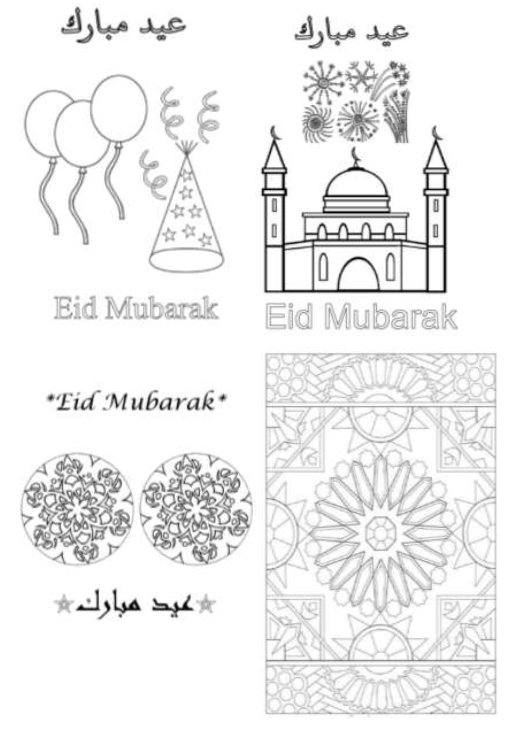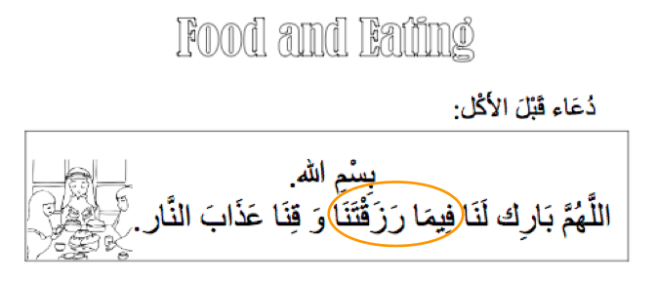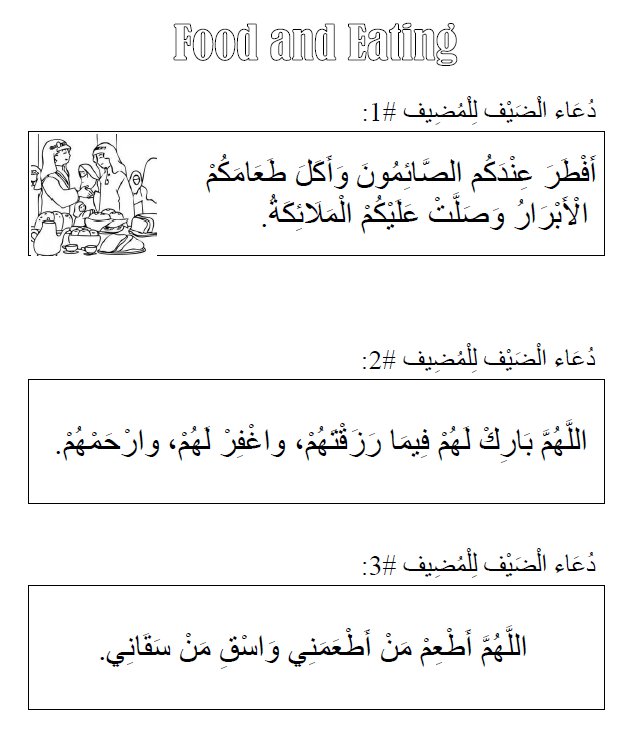In our last instalment of this word-by-word translation series, we went through the translation of فِيمَا رَزَقْتَنَا. Now, we’re going to finish translating the last few words of the du’a.

وَ
wa – and
وَ (wa) means “and”. It’s a very common word. Sometimes, depending on the context, وَ can be translated as “though” or “while” or “when”, but most commonly, it means “and”.
For example, when someone greets you with السَّلامُ عَلَيكُمْ (assalaamu ‘alaykum) “peace be upon you”, you respond with وَ عَلَيْكُمْ السَّلَام (wa ‘alaykum assalaam) “and upon you be peace”. That وَ (wa) at the beginning means “and”.
You’ll also hear وَ when we want to connect or list things together, like:
اَنَا وَ اُخْتِي (anaa wa ukhtee) “I and my sister”
السَّماوَاتِ وَ الْاَرْض (assamaawaati wal ard) “the heavens and the earth”
or الشَّمْس وَ الْقَمَر (ashams wal qamar) “the sun and the moon”.
قِنَا
qinaa – protect us
The first word, قِ (qi) is a command verb asking someone to “protect”.
The second word, نَا (naa), is one we’ve seen twice already in this du’a and it means “us”.
عَذَابَ
‘athaab – punishment
You’ll often see the word عذَاب in a phrase like ِعذَاب النَّار (‘athaab annaar) “punishment of the fire” or ِعَذَاب الْقَبْر (‘athaab alqabr) “punishment of the grave”.
You’ll notice that both phrases include the word “of” in the English translation even though there’s no apparent corresponding word in Arabic. That meaning comes from the مُضَاف (muḍaaf) – مُضَاف اٍلَيْه (muḍaaf ilayh) structure, which we learned about earlier, when translating بِسْمِ الله
النَّار
naar – the fire
ال (al) means “the” and نَار (naar) means “fire”. Interestingly, the Arabic word for fire is similar to the word for light, which is نُور (noor).
That’s it 🙂 We’ve finished the word-by-word translation of this first du’a. Here’s a link to all the previous posts:
Word by word translation: دُعَاء قَبْلَ الْأَكْل
Word by word translation: بِسْمِ الله

 Eid Takbeer includes: Takbeer (saying Allahu Akbar اللهُ أَكْبَر), tahleel (saying la ilaha illa Allah لَا إِلَهَ إِلَّا الله) and taḥmeed (saying walillahi alḥamd وللهِ الْحَمْد which is basically saying alḥamdu lillah الحمد لله or thanks God). It is known as Eid Takbeer because we say it on the Eid day whether it is Eid Alfitr (after Ramadan) or Eid Aladḥa (on the 10th day of thul hijjah.
Eid Takbeer includes: Takbeer (saying Allahu Akbar اللهُ أَكْبَر), tahleel (saying la ilaha illa Allah لَا إِلَهَ إِلَّا الله) and taḥmeed (saying walillahi alḥamd وللهِ الْحَمْد which is basically saying alḥamdu lillah الحمد لله or thanks God). It is known as Eid Takbeer because we say it on the Eid day whether it is Eid Alfitr (after Ramadan) or Eid Aladḥa (on the 10th day of thul hijjah.







